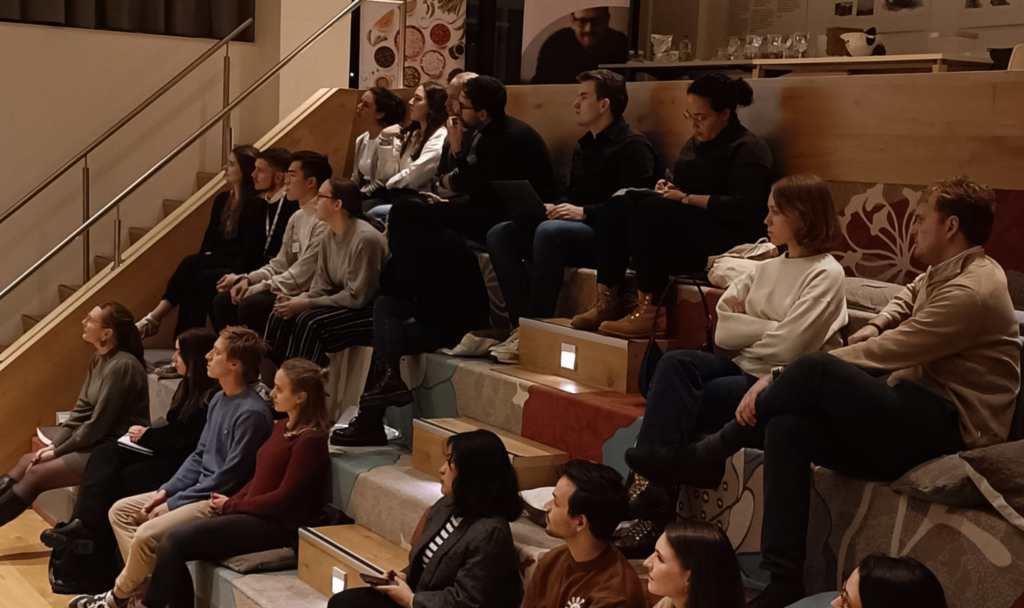Alt Protein Project: join the students driving sustainable protein research across Europe
6 February 2023
Our Science and Technology Community CoordinatorMartina Helmlingeron the exciting work of the Alt Protein Project and how students can get involved.

Students across Europe are part of a growing global movement dedicated to turning universities into dynamic engines for sustainable protein innovation, and we have justopened applicationsfor new groups to apply.
DasAlt Protein Projectis led by students who are passionate about new ways of making meat and are acting as a driving force to bring education and research about plant-based foods, cultivated meat and fermentation to their institutions.
The project is key to building the sustainable protein movement and enables students, with help and support from the Good Food Institute’s experts, to act as catalysts shaping their university’s priorities.
There arenine active European chaptersbased in the Netherlands, Denmark, Germany, the UK, Norway and a pan-European community of students across universities, with more than 130 members – and we now want to double the number of groups.
As we invite others to join the project, let’s take a look at the incredible work students across the continent have achieved so far.

Shaping courses
One of the most important aspects of the Alt Protein Project chapters’work is to develop courses introducing fellow students to the world of sustainable proteins, and the opportunities these nascent industries have to offer.
DasAlt Protein Fundamentals Programme, originally developed by students from theUniversity of Cambridge group, is now being used by other groups across Europe.
DasNorwegian University of Life Science(NMBU) are already launching the second iteration of their version of the course in spring 2023. They have been working closely with their university to make it a permanently offered course. The Norwegian University of Science and Technology (NTNU), too, runs a seven week course based on this programme, and they usually share a plant-based dinner to start off their in-person sessions. Also,Utrecht University’s chapter in the Netherlands is teaching the programme to undergraduate and masters students studying science and business subjects.
Germany’sBayreuth-Kulmbach开发了自己的替代蛋白章Policies and Regulation course, which is now being offered to all masters students studying Global Food, Nutrition and Health, and the group hopes to offer future courses to a wider group.
Kick starting sustainable protein careers
These chapters also play a key role in building links between academic institutions and Europe’s rapidly growing sustainable protein industry.
Wageningen’s group hosted an evening featuring speakers from organisations such as the food processing companyADMand alternative seafood startupsEsencia Foodsand Bluu Seafood, while cultivated meat startups such asQkine,StemBond, andAnimal Alternative Technologieshave spoken at the Cambridge University chapter’s events.
NMBU’s chapter brought inOrkla Alternative Proteinsto provide an insight into the ingredients and processes used to make their Naturli burgers.
The Cambridge University chapter has recently launched a literature review project in collaboration with the Cornell University chapter in the US, giving students the opportunity to dive into an area of sustainable protein research in collaboration with experts in the field, making valuable contributions tohigh impact research opportunities.
DasEIT Foodgroup, based in universities across Europe, hosted an event showcasing the many career paths offered by the sustainable protein sector, with speakers from startupsMeatable,Libre FoodsundPaleo, alongside a cultivated meat researcher and a food law consultant.
Building the research base
Alt Protein Project chapters are also helping build the community of European researchers working on developing new ways of making meat, dairy and seafood.
The Cambridge group carried out an extensive mapping project to identify and reach out to British academics working in relevant areas, and are now organising a workshop bringing these researchers together, along with UK experts and grant agencies
Other student groups have been mapping the expertise within their own institutions to find opportunities for research, course building and other collaborations.
Meanwhile, the NMBU chapter is establishing the Food Lab – an innovation platform supported by the university, aiming to stimulate collaboration with industry and the development of new food innovation courses.
The groups also help students explore their interest in becoming the science communicators of tomorrow, helping explain the science of sustainable proteins clearly to the public. Members of the Wageningen group are now broadcasting the third season of their sustainable proteinpodcast.
Bonding over food
Alt Protein Project chapters are also social groups, organising activities to enable students interested in this area to network – often over delicious food.
The Wageningen group partnered with cultivated meat scaffolding producer Gelatex tohost their end-of-year barbecue, while NMBU held a workshop inviting students to create imaginative flavour combinations for plant-based burgers, and students brought an impressive range of dishes to Bayreuth-Kulmbach’s sustainable proteinpotluckevent. The chapter at the University of Oxford organised social events and a picnic for students interested in sustainable proteins.
Apply to join
If you are interested in becoming part of the global sustainable protein community, receiving mentorship from GFI’s experts, and making your own way in this growing field, we are now accepting applications for new chapters across Europe.
应用程序是开放的,直到3月30日。如果你想要to find out more,join our call on 16 Februaryor take a look at ourstudent resource hubto learn about the opportunities and responsibilities involved. If you have any specific questions, get in touchdirectly with mefor a chat.
Building a sustainable, secure and just food future is one of the most important challenges of the 21st century – I’d love to hear from any students who want to work with us to do that.
Check out some of our other resources for students:
- Find educational courses around the globe through ourdatabase.
- Sign up for ourfree online courseintroducing the science of sustainable proteins.
- Explore ourresource guideexplaining what is available to students.
- Sign up to our quarterlycareers callto find out more about working in sustainable proteins.
- Find inspiration byreading interviewswith trailblazing scientists and engineers.
